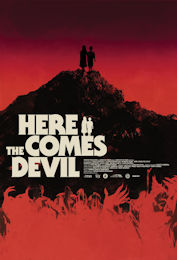
 I was sold on the Mexican horror movie Here Comes The Devil with promises of its dark, violent nihilism. The plot, as I understood it, was that the children of a family on vacation return, drastically changed, after entering a cave and terror ensues. On the surface, I suppose that's true, but the final product is a much stranger, much more mixed bag.
I was sold on the Mexican horror movie Here Comes The Devil with promises of its dark, violent nihilism. The plot, as I understood it, was that the children of a family on vacation return, drastically changed, after entering a cave and terror ensues. On the surface, I suppose that's true, but the final product is a much stranger, much more mixed bag.
The movie begins with lesbian sex, which was not quite what I was imagining for the opening of the film, but the movie seemed to have a particular preoccupation with the subject of sex in general. This lead to some dialogue about one of the lesbian lovers feeling religious guilt for the act and wanting to keep her relationship a secret from the rest of the locals. There's a tension between the two women and, before the guilty party can leave, there's a knock at the front door of the shockingly spacious home. The homeowner goes to see who it is while the other woman dresses. She eventually goes down the stairs to find a man brutally beating her lover and cutting off her fingers with a machete. The woman strikes the killer in the back of the head with a lamp and he runs from the home. Her dying lover asks her if she saw his eyes before it cuts to the killer falling down on the side of a large hill, dumping his box of severed fingers on the ground, and writhing around with his machete, possibly dying. This opening six minutes of an hour-and-a-half-long movie isn't really relevant to anything you see next and barely comes into play in the movie's final minutes, more as a minor, tertiary detail. It really could have been cut. In fact, I'll go ahead and say the whole thing should have been cut because it was mostly irrelevant.
Six minutes in, the actual movie begins. It starts off with a variety of problems. For one thing, the movie has zero atmosphere for much of it. The bright Tijuana landscape and the strange snap-zooms onto people's faces make it look like it came directly out of a 70s kung-fu film. That issue is a constant throughout the film. It's exceptionally apparent anytime a scene is filmed in the sunlit Tijuana hills. For whatever reason this intentional choice was made, it was a bad one. Everything looks cheap and humorous.
Anyway, the family is resting at a gas station. The children sit off alone, together. Their son informs them that the daughter is hurt and bleeding; they find that she's gotten her first period. Their mother takes her to the gas station bathroom to clean her up, while their father limply attempts an explanation to his strangely stoic son. After briefly being spied on by a creepy deliveryman at the gas station through a bathroom door left open for no conceivable reason, the kids want to go wander on the nearby hill (where the serial killer from the opening scene previously died), while the parents want to nap in the car.
As one of the things that make it watchable through the first portion, the acting deserves some credit, particularly from musician Laura Caro (in her only notable acting role) as the children's mother. It feels like a lot is actually learned about the couple after the children wander off. It's another sex scene and you get a basic idea about the couple's relationship while he tries to nudge her into having car sex while fingering her. They tell each other about their earliest sexual acts and eventually fall asleep in the car under the afternoon sun.
They awake to darkening skies. As mentioned previously, the children have not returned and the panicked adults scream into the hills and eventually call the police. It's too dark for a search, so they're sent to a nearby hotel where they immediately descend into arguing and recrimination. The next morning, as they prepare to start searching for their children, a police car arrives with the children inside. It's quickly apparent that the children are distant and emotionless. What's happened during their disappearance is never really probed and their behavior becomes stranger over time, leading to trips to see psychologists. There may have been something darker, potentially abuse, during their missing time and the parents start looking for who might be responsible.
Strange seemingly-paranormal events begin to happen in the home and the parents start to take diverging paths on what they believe is causing the disturbances, both in their lives and in their children. The father looks outside himself for someone to blame and the mother begins to suspect that her children never returned from that hill in Tijuana, leading to her slowly becoming unhinged.
It'd be easy to just write a full beat-for-beat synopsis and spoil the movie entirely, especially since the synopsis on Wikipedia misses large and important details, but someone might actually want to watch it in the future and it isn't that relevant for my conclusions.
The acting quality becomes more obvious as the film goes along and more strain is put on the characters. Though you don't see enough of the children's acting to tell how talented they are, the adults all turn in strong performances. The visuals swing wildly back and forth between laughable and impressive. There's a strange sequence two thirds of the way through the film that shows some actual style. While there's some good camera shots and interesting choices throughout the film, they're often undercut by other moments. For a film often noted for violence, there's not much of it; one scene stands out in the middle of the movie for its sudden, cartoonish gore, only for the movie to return to staid normality.
Looking at it, there's many interesting ideas mixed throughout. Those, combined with the few visually interesting scenes, pushed it up half a point in my estimations, even if it may not have entirely deserved it. I was torn between 2.5 and 3.0, though it's a movie that's probably better in retrospect, as you forget many of the dull moments, laughable cinematographic choices, or confusingly vague plot beats. But that's what this movie is: supernatural ideas that aren't entirely formed and unclear religious epistemologies, wrapped up with some disconnected philosophical notions about the nature of sexual discovery and perversion. It feels more substantial in your own head, trying to examine and explain the movie, than what actually shows up onscreen. In a better-made film, that would be much more of a boon. Instead, we end up with a decent short story stretched out into an inconsistent movie, one which is more easy to recommend as a more nebulous whole than in its constituent parts.

